#this is a one sided conversation it's up to (guided) listener interpretation of what Treasure does and doesn't say
Explore tagged Tumblr posts
Text
let's all just use our brains for a second please. "treasure didn't apologize!" "treasure was wrong too!" YEAH OBVIOUSLY but was there not a point where there was definitely space for them to apologize as well and Porter shut it down? like the part where they (i think, at least) apologized for calling him a coward and porter immediately shut it down and said "no, you were right." hello???
also, for what it's worth, that was almost 20 straight minutes of Porter talking NON STOP ‼️ there was no room for Treasure to get a word in edge wise. AND IT'S IMPLIED THEY WERE GONNA SPEND THE NIGHT TALKING ABOUT THEIR RELATIONSHIP AND BOUNDARIES AND THEY PROBABLY APOLOGIZED IN THAT CONVERSATION
#ANYWAY#this is a one sided conversation it's up to (guided) listener interpretation of what Treasure does and doesn't say#i wasn't here for the fred/bright eyes fiasco but if some of you can't even handle treasure? yeah.#if i see one more post about treasure not apologizing i'm gonna go crazy#🍯#redacted audio#redacted porter#redacted treasure
191 notes
·
View notes
Text
Darkest Nights
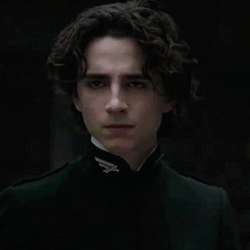
Regulus Black x fem Reader
Summary: It was blatant, that the day of your wedding would come. Yet, you feared it as much as he did.
Words: 2.2k
Warnings: Angst, arranged marriage
A/N: I don´t know too much about Regulus, which is why I decided to interpret this oneshot in my own way. (Also, Timothee Chalamet as Regulus= chefs kiss)
Denial was the first stage you encountered. Blatantly you had been prepared for it your entire life, but when the message reached you, it was still denial. It couldn´t be true, you were promised more time. Time to live.
Any excuse sounded better than the one thrown into your face: There was no other option.
You recalled word for word in your head as you starred at yourself in the large mirror. It should be an honor, you´ll be a good wife, you´ll have a big house. But none of it mattered to you, your priorities laid differently in society. Will I be happy?
The mirror, the room and the entire house was furnished with golden details; flowers, flourishes and patterns. It reminded you of the palaces in the renaissance period. You had loved the paintings from the time, but finding yourself in a similar ensemble on your wedding day felt all too wrong.
A knock appeared on the door and your mother entered, stunned with her hand over her heart as she admired you. The two servants, who had helped you to get ready, carefully stepped back. Their work was done. If it weren´t for your mother´s sake, you´d thank them from the bottom of your heart.
“You look absolutely gorgeous, he´ll be very pleased to see you.”
Yeah, because that´s all that mattered. Your eyes wandered back to your silhouette in the mirror; long, delicate arms of lace traveled down your skin, the train measured at least ten feet and the veil, which was still placed to show your face, followed the train. Your mother handed you the flower bouquet, white, blue and lavender. Then she pulled the veil over your face and nodded a last time. “Your father will be waiting for you downstairs. They´re all ready.”
Heavy chains were attached to your feet and each step you took, was harder.
Outside the hall, where the ceremony would take place, your father waited for you. He matched your mother´s dark attire, but as so often, he loved the embellishments on his suit. In your opinion, they always looked disgustingly conceiting and plump on him. Every cell in your body screamed for you to run and as you stepped inside the large hall, you wondered why you didn´t listen to your heart. Like the rest of the villa, it was stunning and a true architectural treasure. Dark, even wood was spread on the floor and the walls were delicately painted in cool grey tones. Against the gold details, the walls looked like painted clouds, dreamy and far away.
Within the dark ensemble the white spot like a ray of sunshine; you.
Why didn´t you run?
Would it be so bad to never see your family again? A family that had no emotional connection to you, you were never told, how much they loved you or even appreciated you.
You could live a free life, away from all pressure and deciding how you wanted to live. If you wanted to get marry, or not and even more importantly, who.
The painful truth was, that running even as far as you could, only brought you time. You were their only child, their only way to safely secure, pleasant and reputable future. They would find you eventually and by the mark on their forearms, it wouldn´t be a reencounter to spread joy.
Under the veil, none of them saw your shivering jaw and your blinking eyes in tears as you made your way to the altar.
Your father´s hand, softly put over the arm you had linked with this, grabbed you harsh enough to stop you from running. It might have looked like a lovingly scene, how he approached Regulus and placed your hand in his, but it wasn´t.
It felt like somebody threw away the keys from your chains.
Oh, right, Regulus was there as well.
You had barely acknowledged his presence, which was surprising due to the fact that he was your soon to be husband. You would never, not even on your deathbed, admit it, but he looked attractive. Plenty of times you had seen him wear a neat black suit, but today he didn´t look like Mommy´s boy put in attire. Somehow, he looked like a true man in front of the altar.
He seemed so steady and calm, was he even pressured into this?
You had spent almost your entire school career knowing him, he was a year older, but you couldn´t remember a singular conversation between the two of you. You started believing, you never had one.
Regulus wasn´t the scrawny kid anymore. He was tall and had a sleek figure, which he had proved many times as Slytherin´s seeker. His dark, rather short locks framed his angular face and his high cheekbones. He truly looked like a perfect descendant for a pure-blooded family.
His hand was warm, no hint of nervousness, while yours was as cold as ice. He barely glanced at you, both of you facing the altar and the wizard, who guided you through the ceremony.
He was a man of at least sixty years, grey hair and beard, but everything that left his lips, barely entered your conscience.
Finally, it felt like years, the peak of the ceremony had come.
You turned to Regulus, carefully and slowly, his long fingers grabbed the edge of your veil and pulled it back to reveal your face.
What did you expect to see in his expression? Excitement? Awe? Admiration?
For a split second, his jaw tensed, but he turned back to his neutral expression. You didn´t know how to pinpoint those bare split seconds, where his façade had vanished, and you didn´t like, not knowing how he felt. Was he glad to marry you? Was he only looking forward to this, because you were pure-blooded? Did he find you pretty or at least attractive? Or did he find you so attractive, that he wouldn´t hold himself back? Would he follow his instincts and ignore your potential feelings?
You wanted to curse and scream, but your eyes were glued on his lips and you felt how the magical string wrapped around your hands.
“Today Y/N and Regulus join their lives in the union of marriage. Before I declare you to one another, I want to hear you confirm that it is indeed your intention to be married today.”
The lie couldn´t be bigger. A no was stuck in the back of your throat.
“Now I ask you; Do you, Regulus Arcturus Black, take the hereby Y/N Y/L/N as you wife? If so, repeat after me.”
You waited for a stutter, but Regulus repeated the words without hesitation.
“I, Regulus Arcturus Black, take you Y/N Y/L/N, to be my wedded wife. I give to you in the presence of these witnesses, my promise to stay by your side, In sickness and in health, in joy and in sorrow. And cherish you for as long as we both shall live.”
“Bride, please repeat after me.”
Oh, dear Merlin help me to not completely ruin this.
“I, Y/L Y/L/N, take you Regulus Arcturus Black, to be my wedded husband. I give to you in the presence of these witnesses, my promise to stay by your side, In sickness and in health, in joy and in sorrow. And cherish you for as long as we both shall live.”
The magical promise, which wrapped around your hands like a hot string, tightened as the words left your mouth.
“I now announce you, husband and wife!” You felt how the golden glistening oath disappeared, but you still felt the warmth pressing against your skin. It was done. All plans and hopes for this not to happen, were completely useless. You were now officially Y/N Black, wife to Regulus Black. Regulus eyes pierced into yours, somehow you took the last of your strength to keep up the eye contact. Then, to your biggest surprise, he offered you the smallest hint of a smile.
“Even the most beautiful places turn dark during night.”
Regulus´s voice was steady, but quiet. For the first time this evening, he spoke to you in his own will. Without the pressure of a family member watching. You glanced at him, while his eyes were stuck on the ensemble. He was right, it was beautiful.
The light walls were barely enlightened anymore and the golden details, which glistened from time to time, seemed to float in the air. The delicate paint strokes had become invisible, vanishing into dark. Regulus fitted in, with his dark suit, green attire and jet-black locks and you contrasted him in a way, that couldn´t be more opposing. The white fabric attracted the last bit of light, like the rising moon beneath carpet of golden stars.
You had spent the early evening, which was turning into night already, with careless and empty conversation. Even though Regulus was at your side for most of it, you didn´t even perceive him. You were too focused on not crying, not running, not saying the wrong things, not falling over your dress, not eating too much food, not smiling too much, not fake smiling enough and not being you.
“I meant it, you do look stunning”, he added, tilting his head ever so slightly in your direction. Previously, the words had seemed nonchalantly thrown into a conversation. Now, it sounded honest and against his offish body language, Regulus was different beneath his façade.
“Thank you”, you replied with barely a whisper.
For once, he wished to be more like his brother Sirius, who swept of girls with no effort and compliments fell of his lips like the lies for his pranks. Of course, he wasn´t there.
Regulus never imagined that his bride would be you or even closely like you. He remembered you from school, something he never told anymore. Back then, you had barely exchanged words. You knew about each other´s existence, but a safe distance was kept. However, he remembered the evenings at the library. Where you had sat quite focused, tapping with your pen against the book. You had watched every single of his Quidditch games and you cheered.
You were cunning and smart, driven by your own ambition to surpass yourself, but unlike him, you were empathic. People approached you easily, feeling enchanted by your natural politeness. Regulus had become used to the shadow side; people evaded to not get in is way. They avoided him, not knowing what lied behind his dark exterior. Maybe they even feared him.
He knew it was wrong for him to feel relieved to find you in the spot of his bride, he was bereaving you of all prospective dreams and a chance for true love.
“I´m sorry.”
The apology took you by surprise and your head snapped towards him. “For what?”
He sighed, knowing he couldn´t dodge the eye contact anymore. “For having to marry me.”
The emphasis clearly laid on the word me, even though he tried to hide it.
“Are you happy to have me as your-“, you paused. You had never said it out loud. “As your wife?”
He chuckled. Regulus Black chuckled. “I knew marrying out of love was never an option, but honestly, you´re the best bride I could´ve wished for.”
He quickly became serious again, too fast for your taste. “You´re not like them, not as posh or artificial.”
“Apparently, neither are you.” You added, feeling how your body leaned a little closer to his.
“I try my best.”
The dark had covered expectations and superficiality and what was left, was a man at your side, who was honest and real. Not perfect, but not cruel. You didn´t fear him anymore and more importantly, you didn´t fear potential actions. He wouldn´t lay a hand on you, unless you would allow to do so. There was only one apprehension left, the dark mark burning on his arm.
You didn´t know how or why, but that obligation was reserved from you. Slytherin or not, pureblood or not, you weren´t evil. You weren´t one his fealty and you swore on your life, that it wouldn´t change.
Regulus felt your apprehension, but for now he wasn´t ready to share the perilous information with you. The horcrux inside the cave was his secret, but if it meant keeping you safe and sound, he was ready to risk it. For now, it was his task to make you believe him. Regulus Black wasn´t evil and he didn´t share the Dark Lords radical views. The dark mark on his arm was just like the ring on his finger, an inescapable path.
Carefully, but with clear intention, he took your hand. “I will never hurt you; I promise.”
You saw something inside his eyes sparkling, but you couldn´t pinpoint it. Pressing your lips together, you starred at the rings on your fingers. “You shouldn´t make a promise you can´t keep.” He opened his mouth to disagree.
“But promise me to be honest; talk to me Regulus. I don´t want this to be a marriage of secrets and intrigues.” He nodded agreeing. “I promise it, do you?”
“Yes.”
Cautiously, as if you could break beneath his touch, he placed a strand of hair behind your ear and slowly, waiting if you would push away his action, he placed a kiss on your forehead. You didn´t push him away, catching yourself almost leaning into it.
Yes, even the most beautiful places turned dark during night, but tonight the darkness revealed true nature. And in this darkest hour, the two of you were shining together strong as the brightest light.
#regulus black#regulus black imagine#regulus black x reader#regulus arcturus black#regulus black oneshot#timothée chamalet#harry potter imagine#sirius black#mariamermaidimagine
248 notes
·
View notes
Text
Edmund White: Reading is a Passport to the World
When I was a little child, my sister, who was nearly four years older, was astonished that I couldn’t read. We were in my mother’s old Ford, driving around the main square of Hyde Park, and my sister pointed to a sign and said, “You honestly can’t read that?”
“No,” I said sullenly. “What does it say?”
“Graeter’s,” she announced triumphantly, the name of Cincinnati’s premier ice cream maker. “Can’t you see that? What does it say to you?” She wasn’t being mean; she was genuinely puzzled. Reading was a magical portal—once you passed through it, you couldn’t even imagine going back.
I must have been four. Two years later I could read, or at least “sound out” syllables (that was the method then). When I realized that I could interpret these hieroglyphics, I felt so free, as if a whole new world had been opened to me. Now I could herar a chorus of voices, even those coming from other centuries and cultures. I was no longer bound to the squalid here and now, to my mother’s web-spinning of agreeable fantasies or my father’s sudden eruptions of rage, to the sweating summers of that age before air conditioning.
I remember toddling into my mother’s room, where she was taking a perfumed bubble bath in the late afternoon. I announced (or maybe thought), “I’m free. I can read.”
Could I really have had such an improbable thought at age six? Or have I just told myself that that thought occurred to me then? And yet I remember my mother’s sweetness, the good smell, the afternoon sunlight, and my very real feeling of joyful liberation. And, quite concretely, reading has always struck me as a passport to the world, one in which characters are more real than actual people, where values are more intense than in the dim light of reality, where characters fly up into destinies rather than paddle around in ambiguity.
I felt like a blind person who’d just regained his sight. I was no longer a Cincinnatian but rather an earthling. If things were clearly written in English, there was no text that was off-limits. I never read the standard children’s classics. No Wind in the Willows. Only recently did I get around to Treasure Island.
In my twenties and thirties no book was too ambitious for me; I worked my way through Theodor Adorno and Heinrich von Kleist, Roland Barthes and Michel Foucault, though I was drunk most of the time and often had to hold one eye shut. I suppose I was hanging out with a pretty brainy crowd back then, and I felt I had to keep up. I doubt I retained much, though in my thirties and forties I reviewed several books by Barthes and Foucault.
I was so driven back then, it never would have occurred to me to reread a book! My goal was to have read everything, or at least the major works that appealed to me, that seemed essential. Perhaps because I’d never done any graduate work, I felt inferior. I’d never read The Faerie Queene. Worse, I’d been a writer for eight years for Time-Life Books, the ultimate home of the middle-brow. Although I invariably said defensively, “I’m not an intellectual,” I wanted to be one—or at least to be able to refuse demurely that title. Sometimes I took comfort in the idea I was an artist, not an intellectual. I even resorted to the ridiculously snobbish notion I was a “gentleman amateur” and not an intellectual. But I’ve always wanted to have the choice to join any club, especially one that might reject me. For instance, I made a major effort to join the Century Club, for which one had to be sponsored by 11 or 12 current members. Two years after I was accepted, I resigned. Too many lawyers.
Now I do reread at least two books every year—Anna Karenina and Henry Green’s Nothing. Although these two novels are so different one from the other, they both reward closer scrutiny, so much so they scarcely resemble the same book one remembers having read the year before. People complain about the Kitty and Lvov parts of Anna Karenina, but that’s a frivolous charge. Their love stands in dramatic contrast to Anna’s and Vronsky’s passion and is the necessary counterweight to that tragic tale. In the same way, some readers treat Nothing the way they regard all comedy—as lightweight. Actually it is a profound study of the generations and social classes—and unexpectedly it sides with the older, richer people.
“Perhaps some prose is enough like a taut play script that it profits from being read aloud, but almost always a live reading of prose is an exercise in vanity.”
The other book I’ve reread five times in my life is Proust’s. When I was a teenager I read it as the bible of snobbism; it gave me a whole vocabulary to describe this vice that Proust calls “narrow but deep.” Now I read it as the definitive condemnation of snobbism.
For my memoir, I’ve reread a few favorites by Colette, Nabokov, and Tolstoy and read for the first time novels by Guyotat, Giono, and Malaparte. Do we prefer to revisit books we love or to explore the unknown? Are we happier to find new things in the old or to detect familiar themes and strategies in the utterly new and startling? The brilliant novelist of modern manners Alison Lurie once explained to me why she was more popular in England than in America. “For the English I’m writing about an unfamiliar subject [American academic and artistic life] in a familiar style of social satire, whereas for Americans I’m writing in an unusual style about familiar subjects.” Has she touched on an explanation of why we like certain books and not others?
*
Joe Brainard reportedly said on his deathbed, “The best thing about dying is that you never have to go to another poetry reading.” How many times I’ve had to sit through poetry readings in a stuffy room with subaqueous light at the end of a long day and fight against falling asleep! The mind loves a narrative, and in my half sleep my poor brain has spun cartoons made up of chance words, my embarrassment, trace memories (what Freudians call dismissively “the daily residue”), and my shipwrecked will to wake up, or at least not snore.
Everyone says poetry is an oral art, and perhaps some of it is meant to be read out loud. Good actors can make us understand passages in Shakespeare that use obsolete language, though I hate it when pedants hope to indicate the line break or the caesura. I could never make sense of The Tempest until I saw it onstage. On the page I could never keep track of all the characters. Charles Lamb argued in an essay that reading Shakespeare is preferable to seeing him produced, and maybe hammy acting and garish sets and thundering exits and entrances do topple certain of Shakespeare’s cloud castles, but great performances can dial into sharp focus even the vaguest verse.
But does modern poetry gain from being recited out loud? James Merrill was a smooth, trained reader and the smile in his voice could give the reader permission to laugh at his improbable mixture of metaphysics and gossip. His light social tone so often gives way to the sublime that a reader less civilized than he scarcely knows what is funny and what is serious (sometimes both at once, since he thought wisdom was expressed in puns and that the language itself is the collective unconscious).
Percussive poetry like Pound’s translation of the Anglo-Saxon The Seafarer as read by the author himself to the beat of drums can be riveting; a casual scanning of the page would never render the granitic, prehistoric force of this masterpiece. In his recitation (now on YouTube) Pound rolls his r’s, thuds the final d’s, and maintains a shaman’s monotone. Maybe Paul Verlaine’s musical verse (or John Keats’s) is improved by being read out loud, but most 20th- or 21st-century verse is too abstract or too dense to be understood on a single hearing. The mise-en-page, the line breaks, the Latinate or Anglo-Saxon origins of the words, as in tomb and grave (“The tomb in Palestine / Is not the porch of spirits lingering. / It is the grave of Jesus, where he lay”)—these are all elements that surrender themselves only to close reading.
With prose the problem is the speed. Everyone reads at a different pace, and some texts are not interesting or intricate enough to be dosed out at conversational speed. We get it; we want to scan it. Perhaps some prose is enough like a taut play script that it profits from being read aloud, but almost always a live reading of prose is an exercise in vanity. It may be valuable for the fiction writer to gauge the response of his audience, to listen for contradictions or unintended echoes, to detect where people’s attention wanders. But do these practical benefits for the writer outweigh the torture undergone by the public?
Silent, solitary reading (if the book is good) is the best conversation, with all the uhs and ahs edited out, the dead metaphors buried, the dialogue sharpened, the descriptions vivid, the suspense rising, the characters hovering between the unique and the representative. In the great Italian and French guides to good conversation during the Renaissance and 17th century, conversation must avoid pedantry and cruelty and seek above all to please and to entertain. Finally it must be natural; affectation is the worst sin, far worse than flattery, which may even be desirable. In her definitive study The Age of Conversation, Benedetta Craveri (granddaughter to the philosopher Benedetto Croce) argues that good conversation should not make anyone feel inferior or ill at ease but rather the object of a total consideration. And Simone Weil, the French religious philosopher, thought paying attention was a form of prayer.
The novelist or essayist should never mystify for no good reason. We should know why the marquise goes out at five o’clock (if it’s relevant). In an essay we should not be thrown off by academese. An idea may be difficult, but not its expression, as I learned from my beloved Marilyn; the words should be as lucid as possible. The assumption should be that the reader is intelligent but not necessarily informed.
__________________________________
Good read found on the Lithub
0 notes
Photo
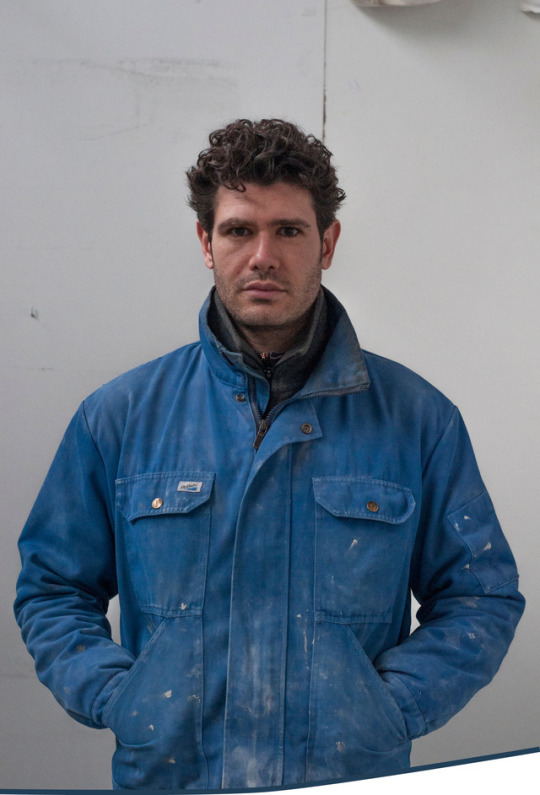
Athar Jaber
A conversation with a sculptor about his work and curiosity for violence.
Nederlandstalige versie
Date of interview: March 5, 2017
Estimated reading time: 17 minutes
Athar Jaber (° 1982), the Iraqi sculptor, was born in Rome in the artistic nest of two painters from the Iraqi diaspora. At age six, he and his mother settled in Florence, where he bloomed as a teenager, driven by the splendor of the city and its classical treasures. After drawing the many hundreds of old marble sculptures Florence has to offer, it is not surprising his work manifests in white Carrara marble. His work Opus 4, which consists of four enormous marble statues, with which he graduated from the Academy of Antwerp heralds a harmonious picture of a body trapped in stone. With surgical precision the young sculptor composed a surreal birth in this work. Where oddly placed limbs seem to predict the later recurring theme of entropy. "I can not just make beautiful sculptures," Athar warns.
The weather was gloomy the day we planned our visit. It’s a drizzly Sunday early March, but the light is graceful and almost pretty in its glow. Photographer (Tom Peeters) and I met Athar in his home in the north of Antwerp. There we drank coffee and talked about the artist's book and art collection. Facing the window, in the middle of the living area is an impressive matt-brown grand piano. The coffee is somewhat too intense for our delicate Sunday stomachs and so we, resounding with caffeine, find ourselves in our car following Athar as he drives towards his studio in the west of Antwerp. Athar leads us, as he hosted us, and indeed as he seems to do everything: distinguished, courteous, controlled.
We talk with the artist about the alienation he felt as a young child, the homeland of his parents, his heroes, violence, artificial intelligence, and his quest for freedom.

Both your uncle, your mother and your father are known painters. Growing up in Florence in the midst of such an artistic family seems romantic. Was that so?
No (laughs). Although not terrible, it was quite difficult to be a second generation child. Not like the terrible images of refugees that confront us now, but there was a certain alienation that has shaped me. Italian was my first language and I was born in Italy, but you have a strange name and ‘otherness’ that makes you a target for negative attention. As a teenager, it was romantic. From my early teens onwards I visited daily the numerous museums and simply hung around the city to draw marble statues. I grew up with painters and artists around me, so drawing was easy.
After your parents left Iraq for studies, three successive waves of war flooded the country of your origin and your parents could never return to it as a result. How was that growing up?
When they left, they said goodbye to their family and environment for a short period. Then the war broke out. The Iraqi diaspora, a whole generation of artists, musicians, directors, writers who left to study in the 70s, have all been forced to leave their homeland behind. Those who were homesick enough to return haven’t survived. Some have been tortured and were able to flee. Some of them got a better situation, some worse.
Although not terrible, it was quite difficult to be a second generation child. Not like the terrible images of refugees that confront us now, but there was a certain alienation that has shaped me.
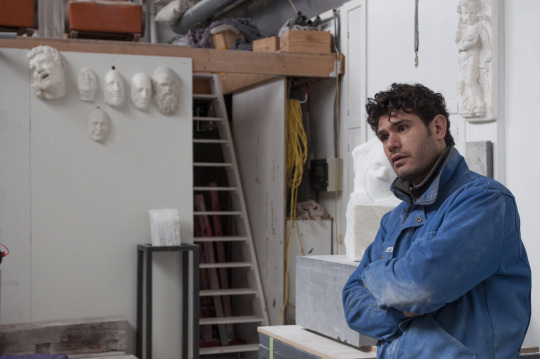
When they (my parents) left, they said goodbye to their family and environment for a short period. Then the war broke out.
Did you grow up with that sadness?
Yes. Even if you listen to older Iraqi music, you feel much sadness and melancholy. It is inherent to the culture. If you wake up in Italy as a child, with full knowledge of the facts and consequences of a war in the country where the rest of your family still lives, you simply have a different view of the world than your peers.
Your work has a bright, beautiful and light side. In your material, the anatomical beauty, the refinement of the result, I see examples of that lightness. But as a spectator you also catch a darker side. Is that derived from your past?
Content wise, my work settles closer to the dark side of life. The bodies and heads are unclear, ambiguous, distorted and broken. An identity crisis is at play. Who you are and where you belong are problems that concern me.
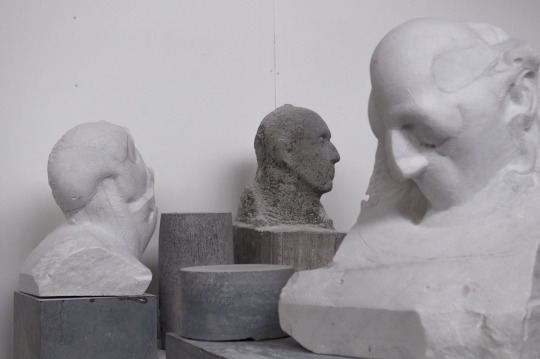
The bodies and heads are unclear, ambiguous, distorted and broken. An identity crisis is at play.
You mentioned earlier in interviews that your national identity no longer affects your current identity, but you are mostly raised by an Iraqi woman who could never return to her homeland. I'm genuinely wondering how and where that distance starts and ends truthfully.
I obviously hate to see what is happening in Iraq. But by now, no more than when I see destruction, war or injustice elsewhere in the world. Syria, Tibet, South America, Africa. After a while you see universal connections and boundaries start blurring. The national parochialism doesn’t fit this time anymore. The world exhibitions, biennales and sports competitions, arisen to affirm boundaries in a healthy way, are also changed and the world has opened up. There are Algerians who represent Germany at biennials, people of African descent to play in European football teams. I really try to think beyond borders and time. In my work you will therefor find few references to time. No clothes, no objects, only the naked body.
The national parochialism doesn’t fit this time anymore.
You have previously studied piano. As a twenty year old you moved to Antwerp to study sculpture and have moved away from music. Why?
With pain in my heart I chose to become an artist. I felt I did not have enough talent to be the pianist I wanted to be. Because of my background I had more talent for visual arts than for music. It has taken me years to make that decision.
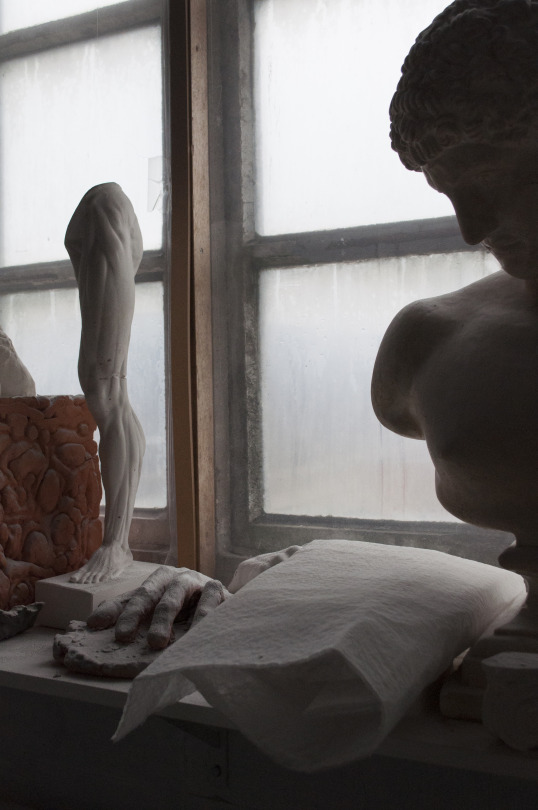
With pain in my heart I chose to become an artist. I felt I did not have enough talent to be the pianist I wanted to be.
You refer to music in your titles. Your first four sculpting began with the title Opus 4, after which each respective image was given a number from 1 to 4. Does music remains to be a great inspirator for you?
I practically named those works, but with a wink to my previous study. People need names, but I do not want to force the spectators to see all things like me. I could have given numbers or codes as scientists do with stars.
But indeed, music may still be one of my biggest influences to date. When listening to certain music, feelings just overwhelm you. Listening to John Coltrane's later recordings gives you absolute freedom for instance! With my work, I of course want to appeal to those feelings. Important feelings, such as prostration, anger and freedom.
Now that you mention a certain 'search for freedom', your first sculptings come to mind. The four works of Opus 4, to me, seem ‘caught’.
Every material has its spatial limitations. I chose to work exclusively with marble. In a later stage of my production, as in my main series (Opus 5), I learned to take more of an acquired freedom. This translates into technique as well as concept: drill holes, chisel tracks and broken fragments remained. Now I dare to let things go: put a sculpture in acid or shoot at it with bullets. I no longer chain myself to traditional sculpture techniques.
When I chose to study art, I instinctively chose this discipline. I didn’t doubt it for a second.
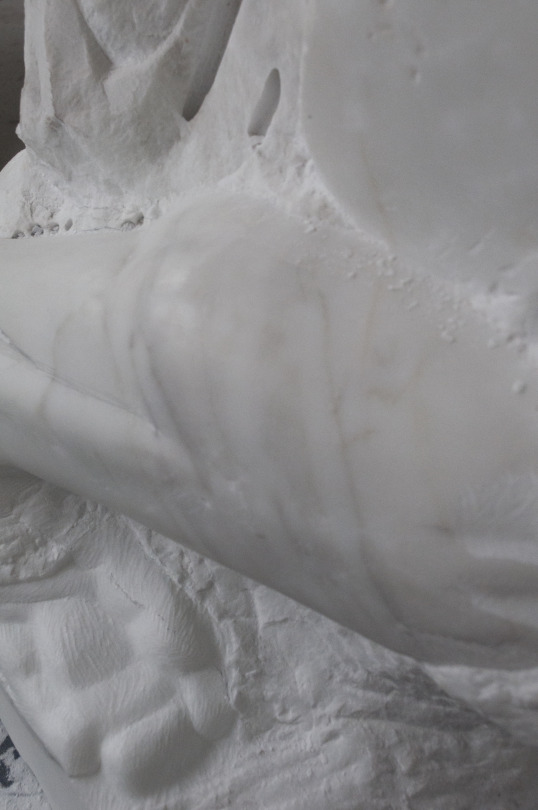
Why marble then?
I think it's rooted in my teenage Italian walks. Then and there a bond with sculpting emerged. You have a more direct and intimate contact with a sculpture than with, for example a painting. When I chose to study art, I instinctively chose this discipline. I didn’t doubt it for a second. Much later, I could explain this rationally: a sculpture takes up our dimensional space and threatens our freedom. It takes away space.
I produce my works directly in marble, they are improvisations. Most sculptors first build up something in clay or plaster and then put that image in marble. I am inspired by what is happening around us. A book, the light, the stone, my state of mind at the moment. It also becomes more personal this way.
I am inspired by what is happening around us. A book, the light, the stone, my state of mind at the moment.
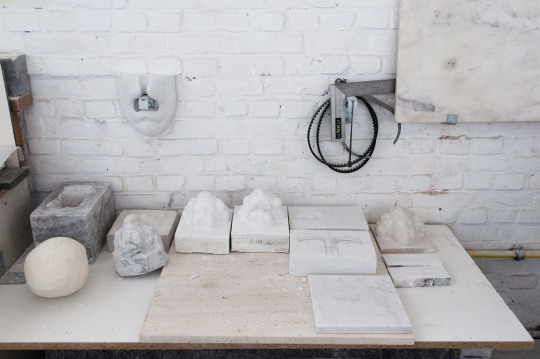
Why do you still work according to the craft’s old techniques in a time of 3D printers and robots?
Exactly because of what I just stated! Many artists work with marble because it fits a certain classical tradition and it is prestigious. Therefore, if you have the economic ability to make it happen, it can, indeed, be done by machines as well. But these artists are no sculptors. What I do is different. I myself work with the material and this action, which today is more and more rare, adds something to the work. It gives it another, almost metaphysical, dimension.
The reproducibility of the sculpture in these times has created enormous freedom for sculptors. Thanks to the technological developments, I can now express my emotion and thoughts in a more abstract way. I can be guided by my state of mind. How I feel at one point affects how I work on another. It is comparable to the moment in history that photography took over the task of painting. This resulted in the creation of abstract art, Dadaism, Expressionism and Surrealism, just to name a few.
The reproducibility of the sculpture in these times has created enormous freedom for sculptors.

So you believe in the aura of an artwork. What does that look like to you?
What impact does the way you make something have for the perception of an image? Creating a sculpture with your bare hands, hammer and chisel, calls for a different interpretation than when it was shot at with firearms and bullets. I sometimes feel a like a torturer. Hammering, chiselling, knocking and removing material with brutal violence while making something beautiful: it is a contradiction. Withall I have experimented with other materials recently, trying to introduce the idea of patinating again. I only use "pigments" that carry a lot of meaning: wine, blood, crude oil, gold. But this is a new project and I don’t want to tell too much about it yet.
Withall I have experimented with other materials recently, trying to introduce the idea of patinating again.
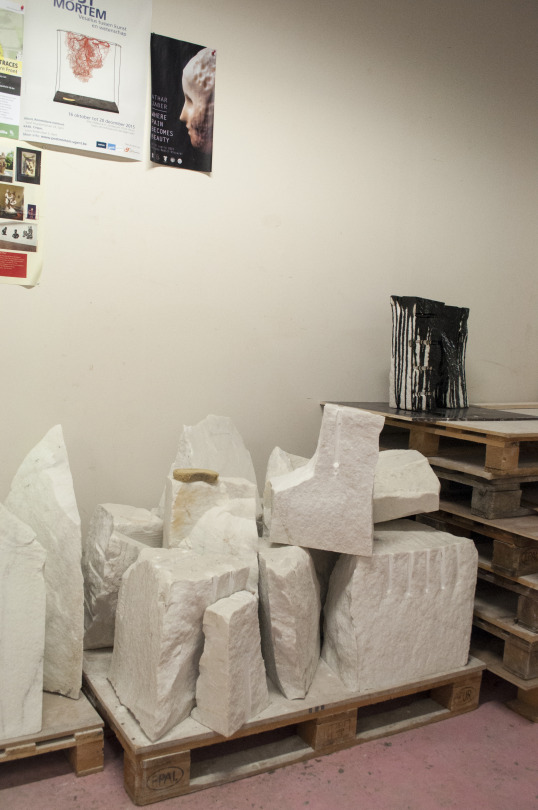
Hammering, chiselling, knocking and removing material with brutal violence while making something beautiful: it is a contradiction.
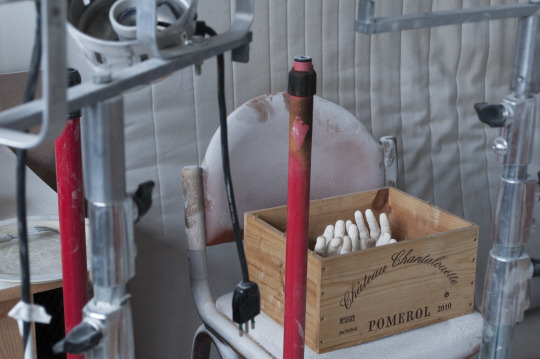
What is it about art that attracts you as an observer?
I am often more moved by music. As an observer I approach art more intuitively and it is difficult to accurately identify what plays then. Last week I visited an exhibition of Cy Twombly. From books I never had a good idea of his work. Actually if you want to talk about the aura of an artwork, he might be a good artist to discuss. His work really touched me. It must have been years since I was so impressed. In front of certain pieces, I was literally ‘resonating’. Probably because of what interests me at the moment. It was about violence. Mainly the series about Achilles and Patroclus and those about Commodus really moved me.
Last week I visited an exhibition of Cy Twombly. (...) It must have been years since I was so impressed.

You told me that you want to get rid of the 'marble block’ in a search for freedom. That, and some other things you told me, reminds me of a book by Hermann Hesse, about the encounter between the intellectual Narziss and the artistic Goldmund, also a sculptor. How do you see yourself in that regard?
I believe I've read that book at the right age. Of course, we always have both characters in us, but maybe sometimes one takes over. On the one hand, I create something that comes from inside, but there is also another side. I'm here for hours, sometimes working for months on one slab of stone. There are days that I don’t say a word. Certainly in my performative works, where the aim is to reach a kind of meditative, transcendental state, I am much more the monk than the emotional artist.
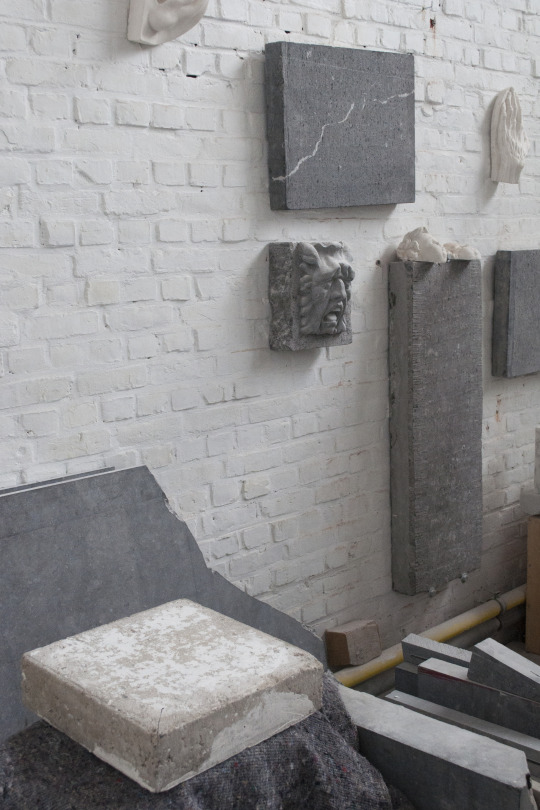
Certainly in my performative works, where the aim is to reach a kind of meditative, transcendental state, I am much more the monk than the emotional artist.
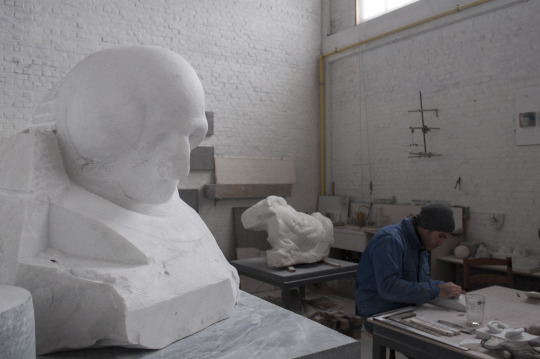
Do you have a fixed rhythm?
I do not like busy places and in my limited free time I like to be at home. Reading, drawing, playing or listening to music. I would rather be in my studio day and night actually, but sometimes I have to rest. It's physically heavy work. In addition, I have to divide my time between my other activities. I teach at the Academy of Antwerp, recently started a doctorate in the arts, am a member of the Young Academy in Brussels, and I often have to travel abroad for my exhibitions and projects. Those things must happen and it keeps you going steady as an artist, but first of all I'm sculptor. I prefer being in my studio.
Being an artist is not a pastime, it is a luxurious but serious activity that carries responsibilities. It has to be taken seriously.
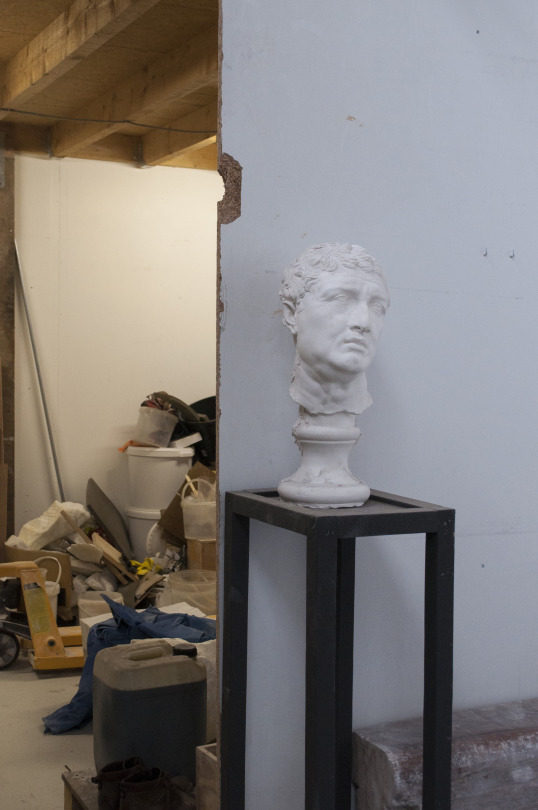
What are you trying to teach your students?
At the academy I teach ‘portraits' and ‘stone sculpting'. Especially that last course comes down to hard work. I can teach them relatively little. In the end students have to do it themselves. I can only show them and give small tips. As a teacher I set the bar high. Whatever you do, you have to work hard. Being an artist is not a pastime, it is a luxurious but serious activity that carries responsibilities. It has to be taken seriously. I do not want to discriminate between expressions, anything is possible. It is important that young artists take their freedoms and develop their own language and not be influenced by the teachers too much. Many times I speak with curators and directors of museums and they often contradict each other. Ultimately, you have to decide what you want to do and go for it.
What will your doctorate be about?
It’s a "Doctorate in the Arts" that will develop over the next four years. It is practice-oriented so my artistic research will be emphasised and the PhD will also be mainly conducted in that language. It gives me the chance to be in the studio.
As a sculptor you show the same violence as a torturer.

My doctorate will deal with violence and beauty and the tension between the two. Removing material as a concept is already violent. If I take something from you, it's violent. Taking stone away from a block of marble through hammering is quite a violent action. As a sculptor you show the same violence as a torturer. During the doctorate, I will develop and apply new techniques to remove material. Techniques that refer to other realities.
When I saw how Isis broke sculptures, I was appalled. In consequence, I decided to start using their methods for creating images instead of destructing them. For example, I want to drag a block of marble behind a car and see what that causes. It leaves behind traces on the marble and at the same time, I keep adhering to the classic definition of sculpture: to create by removing (material). Such and other similar actions will be developed and documented to investigate the relationship between violence, destruction and creativity.
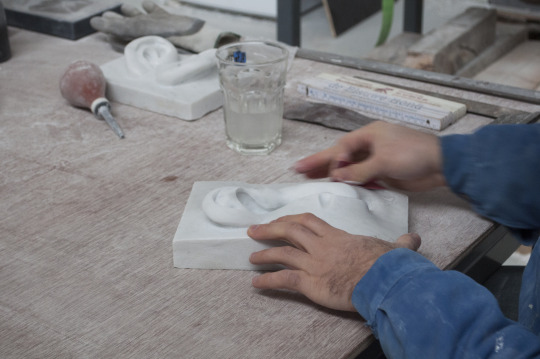
When I saw how Isis broke sculptures, I was appalled. In consequence, I decided to start using their methods for creating images instead of destructing them.
A recurring idea in your work is that the world automatically tends to disorder or entropy. What are your thoughts about this today?
I can explain that best with music. An injury or deformation is similar to me to a dissonance. A dissonance occurs when two elements that don’t belong together are put side by side. A dissonance in music arises when notes do not belong together. It creates tension. You need moments of pauze to recreate harmony. Harmony is a utopian ideal. However, as music history progresses, those dissonances have become more and more important and have prevailed. Music has become more abstract, and many loose their affinity or starting point with contemporary classical music. I consider this to be a metaphor for the concept of entropy. Like the stars in the universe always accelerating to further disassemblage. In my work that translates, for example, in strange physical combinations, like ears beside a mouth, an arm ending in a foot, strange deformities, disorder, tension, blurriness, abstraction. Marble is relatively eternal, but we know that it also will eventually be pulverised. I want to prove that nothing is wrong with that. Learn to accept our finality and appreciate it.

So is working with an 'eternal' material an attempt to let go of your existential ‘angst’ of dying?
Disorder or the metamorphosis to another state is natural. We do not give ourselves over when we say that's okay. Death is coming anyway. That realisation confronts me during the creating process. I try to gradually accept it and do something with it. Ultimately, it is the driving force that engages us all. I work with a material that stays "forever", while I am aware that also the heritage of ancient civilisations is doomed to disappear. Isis or not. That confronts our existential life questions. History shows that murders and war are part of our nature. We shouldn’t welcome that but accept it as a hard truth and yet aim for a better harmony. Even though it is hopeless. To show this issue, I'm doing it myself, on marble, without too much impact on our world. Marble allows me to do so.
I work with a material that stays "forever", while I am aware that also the heritage of ancient civilisations is doomed to disappear. Isis or not.
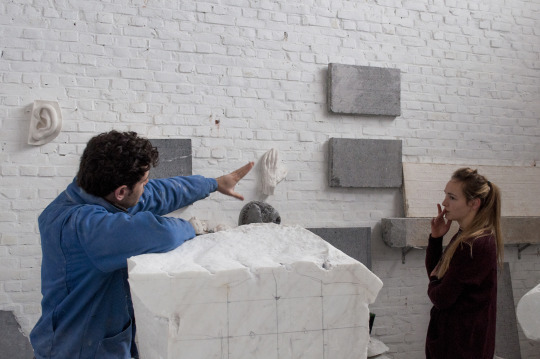
Are you a violent person?
We are all violent. But there are ways to channel this. If I take off material with a hammer and a chisel for hours and hours, I come across a kind of trance, and I enjoy it. That raises questions. Why does a human being do things like that? Sculpting is extremely physically heavy. In winter it's freezing cold in here, my body and my hands hurt, it's dusty and dirty, yet I enjoy every moment. I'm not just doing this for the result, I also enjoy the action. My body and my brain are addicted to it. Otherwise, you can not keep doing it. I can’t just make beautiful statues. Leave that to some other artists and the machines. The question you asked about the new technologies and aura in art leads us to talk about the action and the human motive. Why do you do it?
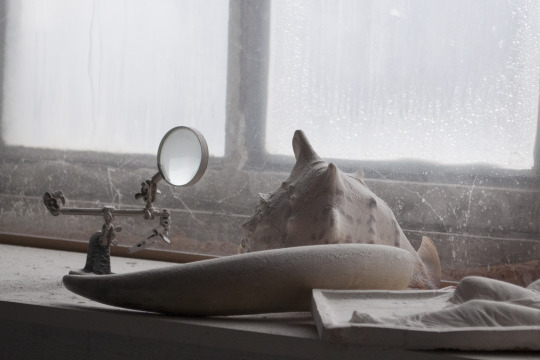
I can’t just make beautiful statues. Leave that to some other artists and the machines.
In your production you choose for slowness, so that you can incorporate personal emotions into the stone. That's your conceptual choice. A next step in artificial intelligence however is to create a being that will be able to imitate that more and more. Have you seen the "Westworld" series?
Yes. Have you seen the 1970's film on which the series is based? It is darker, and simpler. You know there are already robots making art in an intuitive way? But A.I. can not think independently yet. If that ever can, those will be other thoughts than ours. Now more than ever we must keep our humanity.
Interview: Merel Daemen
Revision English text: Gary Leddington
Photography: Tom Peeters
0 notes